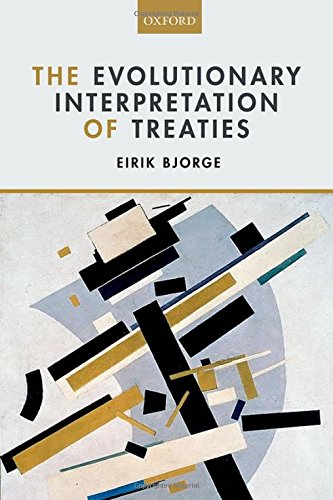All books / Book
The Evolutionary Interpretation of Treaties

| Full title: | The Evolutionary Interpretation of Treaties |
|---|---|
| ISBN: | 9780198716143 |
| ISBN 10: | 0198716141 |
| Authors: | Bjorge, Eirik |
| Publisher: | Oxford University Press |
| Edition: | 1 |
| Num. pages: | 240 |
| Binding: | Hardcover |
| Language: | en |
| Published on: | 2014 |
Read the reviews and/or buy it on Amazon.com
Synopsis
The Question Of Whether The Meaning Of Terms Used In Treaties Can Evolve Over Time Is Highly Contentious Within International Law. This Book Examines How Treaties Should Be Interpreted, And How Best To Marry The Intention Of The Parties To The Treaty With The Changing Socio-political Context Over Time. 1. Introduction -- 1.1. Research Question And Argument -- 1.2. Impermissibility Of Courts Reconstructing Treaty Obligations -- 1.3. Outline Of The Positions With Which This Book Takes Issue -- 1.4. Methodological Questions -- 2. Different Regimes, Different Methods Of Interpretation? -- 2.1. Introduction -- 2.2. Constitutional Treaties, Human Rights Treaties, 'ordinary Treaties' -- 2.3. Systemic Coherence In Both Content And Method -- 2.4. Conclusion -- 3. The Means Of Interpretation Admissible For The Establishment Of The Intention Of The Parties -- 3.1. Introduction -- 3.2. Evolutionary Interpretation And Good Faith -- 3.3. Evolutionary Interpretation And The Intention Of The Parties -- 3.4. Conclusion -- 4. The Intertemporal Law -- 4.1. Introduction -- 4.2. Normative Criticisms Of The Principle Of Intertemporality -- 4.3. Jus Cogens Superveniens: Peremptory Norms And Time -- 4.4. Conclusion -- 5. Evolutionary Interpretation, Or Not? : Evolutionary Interpretation And Jurisdiction Ratione Temporis -- 5.1. Introduction -- 5.2. Jurisdiction Ratione Temporis In The European Court Of Human Rights -- 5.3. The Traditional Doctrine Of Jurisdiction Ratione Temporis -- 5.4. Conclusion -- 6. Conclusion : Evolution Intended -- 6.1. Intention Of The Parties And Evolution -- 6.2. One Coherent Method Of Treaty Interpretation -- 6.3. Evolving International Law -- 6.4. A Redundant Concept?. Eirik Bjorge. Includes Bibliographical References (pages 195-208) And Index.